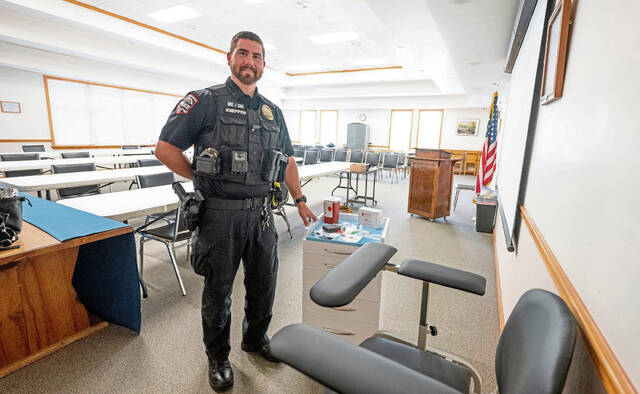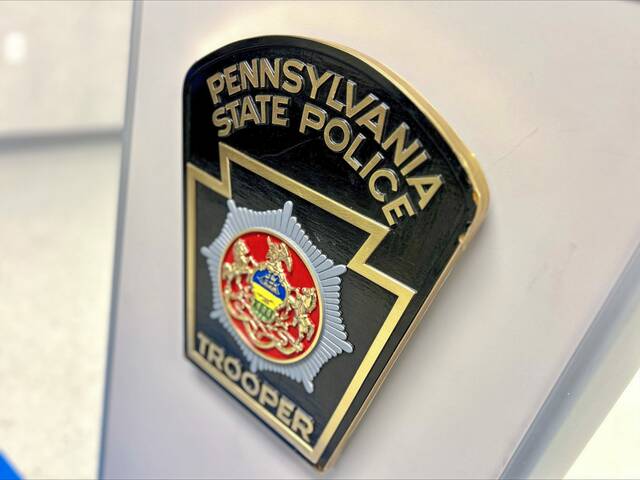When Ligonier Valley police Officer Shawn Knepper makes a traffic stop, he may end up taking the driver’s blood as well as his or her name, age and license number.
Knepper recently became one of 19 municipal law enforcement officers in the state who have gained certification as a phlebotomist through a program of the Pennsylvania DUI Association.
Now, if Knepper stops a driver who is suspected of impairment or is called out to assist another officer on a traffic stop, he can bring the motorist to the police station north of Ligonier and draw a blood sample for drug testing.
That can save time and money for the police department, which previously would drive a suspect to a hospital to have blood drawn.
“We’re out here in a rural area where we’re, at best, 25 minutes from the closest hospital,” said Knepper, who serves as a school resource officer for the Ligonier Valley School District during weekdays. “If we have a suspected drugged driver, I can do an evaluation and, at the end, we can request the blood draw. And I can do it right then and there.”
How Knepper got certified
Funding provided through the Pennsylvania DUI Association covered Knepper’s phlebotomy training, related equipment and supplies. That includes a chair with an armrest, similar to those used in medical facilities, and kits he’ll use to collect blood and send it to a lab for analysis.
In July, Knepper and five other municipal police officers completed a week of phlebotomy training through the DUI Association — in partnership with WellSpan Health, a medical provider with locations in south-central Pennsylvania.
Knepper shadowed WellSpan phlebotomists. He also had to complete 50 successful needle sticks in patient veins as a condition of his certification.
“We did this in the field, not with DUI suspects but with people who were coming to a WellSpan facility to get their phlebotomy draws done,” Knepper said.
For now, the DUI Association also will cover the cost of analysis for blood samples sent to Montgomery County-based NMS Labs.
“That’s a money savings for us,” said Ligonier Valley police Chief Mike Matrunics.
The chief said it had been costing the Ligonier Valley department more than $250 to have a blood sample tested.
The DUI Association’s phlebotomy program is in the second of three years of funding through the National Highway Traffic Safety Administration, according to the association’s Dave Andrascik, state coordinator of its Drug Evaluation and Classification Program.
“We have to do a monthly report to the federal government, and they reimburse us for the training and the blood testing.” Andrascik said. “Most other states have a law enforcement phlebotomy program. We modeled ours after three successful programs in Arizona, Missouri and Georgia.”
Saves time, money
Andrascik estimated more than 57 hours of policing time has been saved in participating departments since August 2024, as officers trained through the phlebotomy program completed 66 blood draws.
“Hospital personnel like that we’re training the officers,” Andrascik said.
If police bring in fewer impaired drivers for blood draws, he said, hospitals can focus that much more of their resources on caring for patients who are experiencing medical emergencies.
Sgt. Jim Ciocco, a recently trained phlebotomist with the Port Authority of Allegheny County police, said the department can respond to incidents involving transit vehicles or properties. He also takes part in DUI task force patrols and checkpoints in Allegheny County.
Ciocco said it can take his department an extra hour to 75 minutes to take an suspected impaired driver to a Pittsburgh hospital for a blood draw. He said there have been occasions, depending on how busy hospital staff may be, when a blood draw has been delayed or refused.
He added that his department tries to expedite processing of impaired motorists for the safety of the suspect as well as the officers.
“We try to get people in and out as quickly as possible, to a safe environment, to their home or to someone who can pick them up,” he said.
Helps with drug-impaired cases
The goal of the officer phlebotomy program, by supporting enforcement, is to cut down on the growing number of drivers who are impaired through drug use.
Matrunics and Ciocco said their forces have seen an increase in drivers who are impaired on drugs rather than being intoxicated on alcohol. They did not have data readily on hand to quantify their drugged-driving cases.
Statewide, police statistics for 2023 show there were 40,823 DUI arrests. Of those, 28,020 charges were filed for drugged driving, which represents more than 35% of all charges filed under Pennsylvania’s DUI law.
Ciocco suggested a rise in drug-impaired driving arrests might be due, in part, to having more officers who are better trained to detect motorists who are under the influence.
Ciocco is one of two officers on the transit force who have been trained as drug recognition experts, which is another offering of the DUI Association.
Knepper completed the drug recognition training before getting the additional phlebotomy certification. He was trained to look for signs of a driver being affected by any one of seven categories of drugs.
“With cannabis, there’s a lack of convergence of the eyes,” he said. In such an instance, according to the Cleveland Clinic, a person’s eyes can’t point inward together when looking at close-up objects.
“We’re not going to call him out every time to do a blood draw,” Matrunics said of Knepper.
Matrunics said use of Knepper’s phlebotomy skills will depend on his availability and likely will be focused on cases where drug impairment is suspected.
The department will continue to make use of hospital staff to draw blood samples when Knepper isn’t available. Samples being tested for alcohol content will be sent to a state police crime lab, Matrunics said.
Blood draws policy
The Ligonier Valley Police Commission has a newly adopted policy that has set guidelines for Knepper, including requirement of a monthly log of blood draws, his completion of a phlebotomy refresher course at two-year intervals, use of protective gear during draws and following a set of medical procedures in the event of an accidental needle stick of any involved officers.
Blood draws are not to be performed in a police vehicle or at roadside. A blood draw may be performed in the case of voluntary consent or request by the driver, implied consent or a valid search warrant or court order.
If a suspect is combative, handcuffs may be used if deemed necessary for safety during a blood draw. Only reasonable force and the least restrictive available measures are to be used.
A request for the Ligonier Valley phlebotomist to assist another law enforcement agency may be honored “if reasonably practicable.”
The Port Authority of Allegheny County police are working on a policy for their phlebotomy procedures, as is the Pittsburgh Police Department, which has its own certified phlebotomist on the force.








